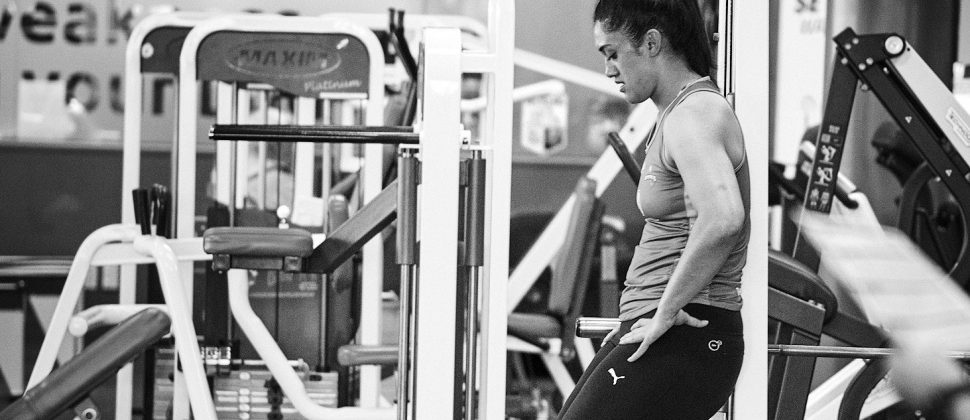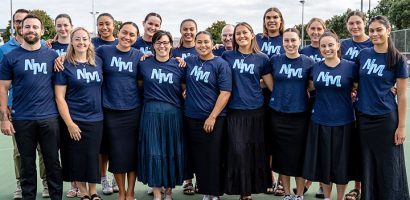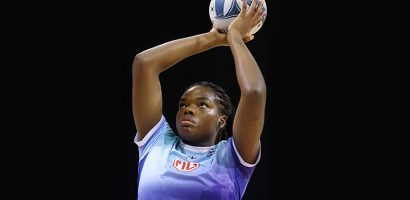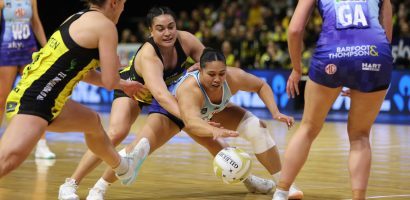Sulu’s Covid battle goes straight to the heart

Original Author: Suzanne McFadden, LockerRoom
Silver Fern Sulu Fitzpatrick opens up about the coronavirus infection that’s affected her physically, mentally, emotionally and financially, and stalled her return to lead the champion Mystics side.
Sulu Fitzpatrick dreaded the shrill of the phone ringing in the tiny isolation room she’d be stuck in for 17 days. That sound meant having to get out of bed and walk three steps to the desk – something the outstanding Silver Fern defender could barely manage.
Alone in an Auckland MIQ hotel, Fitzpatrick spent a week virtually bedridden after contracting Covid-19 immediately after the Silver Ferns played in England in early January.
It drained all her energy, left her emotionally overwhelmed and mentally exhausted.
“Even the thought of answering the phone, I was like ‘Ohhh nooo’… and it wasn’t as if I had anything else to do,” she says. “That first week was a real struggle for me. I cried a lot. And I don’t cry that often.”
The woman crowned New Zealand’s top netballer last season battled physically and mentally too – separated from her eight-year-old twins, Theresa and Tevita, for the longest time in their lives.
And now the post-Covid struggle continues for the Mystics captain, who’s still some way off joining the rest of her ANZ Premiership champions team and training at high intensity again.
Her heart and her lungs, in particular, are still feeling the strain of Covid.
She’s having to employ patience not to rush her recovery to get back out on court. “If I had my way, I’d just push through it. But that wouldn’t help my family or the team,” she says.
And her mind needs some attention too. She grappled with social anxiety when she was finally allowed to go home to her partner, Andrew, and their children on Waitangi Day, and now “fights every day” not to continue isolating from other people.
“If I could choose, I would just sit in my house with my family, cut off from everyone,” she says. “But I’m really consciously working on it, more so for my kids and my team.”
It’s not the worst sickness Fitzpatrick has suffered, she says, “but it’s lingered the longest… I still haven’t fully recovered.
“When your body is the tool of your trade, you don’t have that luxury of waiting till your body fully recovers. And I’m really impatient, I just want to get back into training with the girls. But I’m learning to get my body right first.”
Fitzpatrick was one of an undisclosed number of people in the Silver Ferns’ travelling party to have Covid when they arrived home from a tough northern tour, finishing third in the Quad Series behind Australia and England.
The recipient of the Dame Lois Muir Award in 2021, given her first run as Silver Ferns captain late last year, Fitzpatrick has no idea where she caught the virus.
“We were celebrating when we all got our negative tests back [in England] to know we were able to fly home,” she says. “Of course, when we got home, we got a shock.”
Fitzpatrick remembers first feeling unwell as soon as the plane landed in Auckland. “I thought maybe my body just gave out on me, decided it needed a rest. Or I was old and had jetlag,” the 29-year-old says.
“I had a persistent headache that just would not go away, body aches, fatigue and night sweats. My first test came back negative, but I knew what was coming.” Her day three test was positive for Covid.
Her first reaction was to cry – and cry some more.
“It was an immensely emotionally-draining experience. You have this lingering fear of ‘Am I going to get it?’ so when you do get it, it’s quite overwhelming. Probably not so much the sickness, but the bigger picture,” she says.
“I’m a sickly person, but this virus is quite heavy. It’s full of so many different things – like the pressures of protecting my kids, and my nana. I’m so grateful I didn’t go straight home and take it there. And then there’s all the conflicting views that Covid carries with it.
“It was an emotional battle for the team, too. While we knew we were blessed to be able to go over and play, it was quite tough preparing to go. And we were comfortable with everything put in place to protect us.”
While most of the Silver Ferns’ party left MIQ after 10 days, Fitzpatrick ended up staying for 17.
“It solidified that I never want to go to jail,” she laughs.
What made it particularly hard, though, was the “cumulative effect” of all the Covid bubbles she’d been in. The team were kept in isolation before they left New Zealand, lived in a bubble while in England where the Omicron variant was rife, and then MIQ back in Auckland.
“Before we left, the tour was going to be the longest I’d ever been away from my kids. Since they’ve been born, they’ve been at my hip. So I was really nervous about how I’d handle that. That’s where the tears came from,” Fitzpatrick says.
She’s made no secret of her mental health struggles in the past and the post-natal depression she went through.
“I struggle in my head anyway, so when you put me in a room with myself 24 hours a day, it’s a lot of time to be sitting inside your head,” she says. “So to get that extension in isolation was a bit much.
“But the kids were fine, they drove past my room with Andrew every day to wave to me and drop off snacks for Mum.”
Fitzpatrick tried to stay active during her MIQ isolation; the Silver Ferns were given stationary bikes in their rooms, and could do online fitness classes.
“In that first week I tried to ride the bike, but my body didn’t want it. I even tried a Zumba class, which my body didn’t like either. I got in trouble with the doctor, so I went back to walking my 30 minutes outside every day,” she laughs.
Sports physician Dr Chris Milne, writing in New Zealand Doctor, recommends Covid-infected athletes rest for at least two weeks once they’re asymptomatic. Then, after an extensive medical check-up, training should resume on a graduated basis.
For Fitzpatrick, that’s meant a lot of appointments with doctors and specialists to make sure she’s okay before starting high intensity training again.
Her heart has been a major part of the puzzle in her return to the court, with the start of the ANZ Premiership season less than three weeks away.
“I have clearance for my heart now, but we weren’t sure about that at first,” she says. “It’s my lungs that aren’t co-operating at the moment.
“They’re taking a while to recover and that’s making my heart work harder to do some things. We’re working on getting my lungs right so I can ramp up my training.”
She’s just “graduated from walking” to do light training at a safe heart rate.
“I’m happy because I can be connected with the team again,” Fitzpatrick says. “I’ve been very patient – but also pressuring the team doctor, physio and trainer to let me do more.”
She doesn’t feel any expectation be ready to play in the opening game of the season, against the Magic, on March 13.
“The big thing that’s helped me is I haven’t been under pressure. If anything I’m putting pressure on the Silver Ferns and the Mystics to get back out there,” she says.
“But they’re both making sure the priority is that I’m safe and healthy first. They’re very aware of the impact it’s had mentally and emotionally, and that can transfer onto the court as well.”
Mystics coach Helene Wilson says there was no question around easing Fitzpatrick slowly back into the fold.
“It might be hard if you think about it from a performance perspective – you want your best team playing. But when you think of your players as people and care about their health, it’s easy to follow a plan,” she says.
That’s where Fitzpatrick feels grateful – to have support around her. “In sport you have all these support people and networks of others so I’m able to get those appointments,” she says.
“I have health insurance, but you’ve got to pay up front first and then get reimbursed. That’s a chunk of money that goes out of the monthly budget, and that’s tough on me. So I can only imagine what it’s like for people who don’t have support systems or people who can help to tide you over. That could tip you.
“It’s been a struggle and my heart goes out to people who don’t have any support.”
She hopes New Zealanders will “learn to navigate and find a way to live with Covid – to prioritise looking after people, but also to get on with living our lives. Especially as a mum, I want my kids just to go out and live, rather than being anxious about something they can’t control.
“It’s something we’re figuring out as we go.”
All of the Mystics players are fully vaccinated, and none have tested positive for Covid while back in the team environment. But “close contact” guidelines have impacted who can train and play.
“This year isn’t going to be like any other year,” Wilson says. “It will be about how all 12 of your players adapt to playing on court on any given day. We live in Auckland and we’re living with Covid. It could potentially be a different Mystics line-up every week.”
Even if Fitzpatrick isn’t ready to play 60 minutes – or play at all – on March 13, she will still have a role in the team as a leader, Wilson says. “Her return to play might mean exploring what leadership is. You can lead in other ways, as Michaela Sokolich-Beatson has shown us for the last two seasons.”












